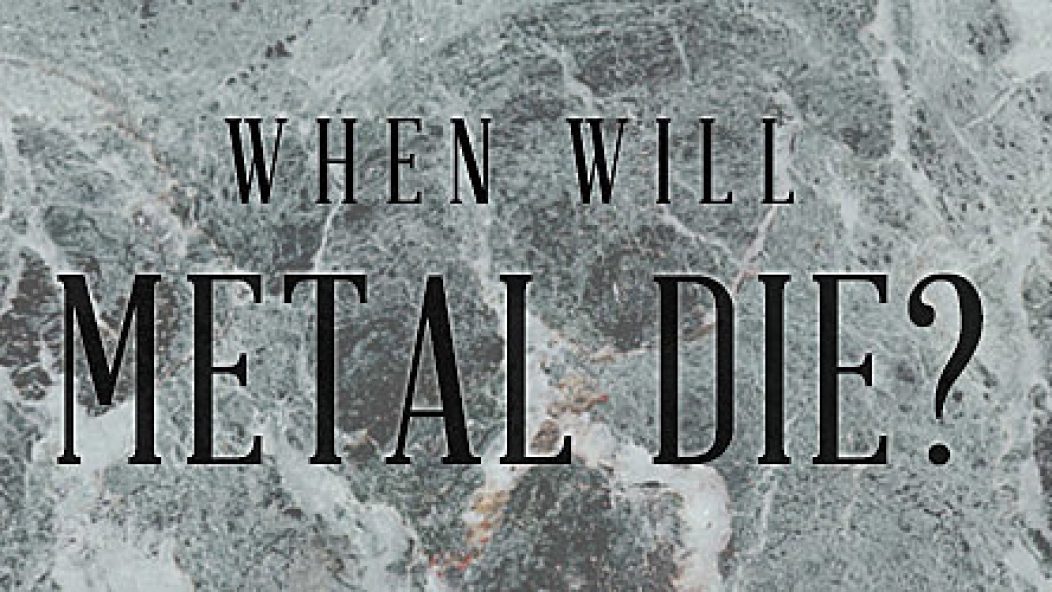
When Will Metal Die?
. . .
This question has been floating around in the back of my mind for a few weeks now. It surprises me that a genre so preoccupied with death and social collapse would fail to ask it more often. Metal has already grown larger and lasted longer than many of its progenitors expected it to. One of them, Ronnie James Dio, said that metal will never die. He is dead now, sadly.
So it goes. I assume that metal will die off eventually because metal is a human contrivance, and it strikes me as unlikely that humanity will be around forever. If we accept this premise (and many a metal band has, lyrically), then we’ve accepted that metal will die eventually. In all likelihood, it will croak before humanity does. The question is when.
Do we need to ask this question? Nope. Metal could evaporate tomorrow, and I’d still listen to it today. But the bare fact of mortality has a way of adding significance to things. (The Sound of Perseverance matters more to me by sheer virtue of being the last Death album, for instance.) And, like most grossly hypothetical questions, it’s fun to think about.”
. . .
Since musical genres are collective ideas rather than organisms, there’s some question as to what ‘death’ means. To spare you guys a lengthy philosophical/terminological discussion, I’m positing the following definition:
A genre dies when so few musicians write music that they identify as a part of said genre that its canon ceases to meaningfully expand.
I’m emphasizing the self-identification element because genres thrive only when people consciously embrace them. Few artists will identify with a genre that’s considered embarrassing or archaic. I doubt that Sacha Cohen would appreciate the idea that his Borat character constitutes a modern minstrel show, for instance.
To get a sense of this definition’s implications, let’s look at punk rock and disco, the two popular music genres most frequently declared ‘dead’. Bands that call themselves ‘punk rock’ form and record albums all the time. Punk can therefore not be accurately described as ‘dead’ under my definition, regardless of what you think of the quality of contemporary punk rock. Disco, on the other hand, is dead, despite serving as an influence for quite a few top-selling current acts. The term itself is pejorative now; nobody calls themselves disco. (Or maybe they do, but if so, they do it out of my earshot.)
. . .
So, then, when will metal die? I’ve broken the possibilities down into four periods. Note that the demise probabilities are utterly intuitive and arbitrary. I’m just spitballing here.
THE SHORT TERM: WITHIN 30 YEARS
Metal has been around for more than 40 years. Though its commercial heyday is behind it, it continues to spread and evolve. It’s producing more new music now than it has at any time during its history. Metal is subculturally strong; people still declare themselves metalheads with pride. At the same time, it’s nowhere near the saturation point in the broader culture, as it was during the ’80s.
In short, metal is healthy. Healthy, broad-based genres rarely vanish in a matter of a few years, or even a few decades. For this reason, I suspect that metal stands a better-than-even chance of surviving the next 30 years.
Despite its current vitality, metal could still die off relatively quickly. A new mutation of metal might branch off, become its own genre, and supplant metal’s current popularity. A sudden cultural shift could render metal’s preoccupation with violence and power unpalatable. An environmental catastrophe could lead to electricity or wood rationing, which would make the required instruments too expensive. Or we might just blow ourselves up as a species.
But I think it’s more likely that metal, like jazz before it, will be partially or wholly welcomed into establishment music culture. Worse things have happened. I can see it now: Metal conservatories. Metal music history courses—Blastbeat Techniques 210. Professional musicians who specialize in “metal standards”. Scott Ian, our music’s Wynton Marsalis, leading Big Four covers concerts at Lincoln Center.
METAL DEMISE PROBABILITY: 40%
. . .
THE MEDIUM TERM: WITHIN 100 YEARS
The death of metal becomes considerably more likely over this period. By its end, all of metal’s founding fathers will have passed away. The extinction risks from the thirty-year tranche still apply. As time goes on, it becomes more likely that changes in social tastes, norms, or resources will undermine metal.
A couple of risks increase dramatically in the medium term. The first is that of widespread social collapse or even human extinction. If civilization craps out—because of persistent fighting over resources, say—nobody will have the free time to practice their harmonic minor string-skipping licks. A global mass-death event would also put paid to metal, of course.
The second risk is the possibility that a new musical style or technology will make metal obsolete. When electric instruments and modern recording techniques became prevalent in the mid-20th century, most of the music that came before fell out of favor very quickly. I’m imagining a technological or stylistic shift on the order of the vacuum-tube guitar amplifier or the 4/4 backbeat.
Such an innovation would almost certainly relegate metal to the history books—a few people will still listen to it, but for its old-timey quaintness, not as a living subculture. Shitty, but at least we’ll have next-generation hypermusic.
METAL DEMISE PROBABILITY: 85%
. . .
THE LONG TERM: WITHIN 1,000 YEARS
As time marches on, the end of metal approaches a certainty. Like most forms of music, metal is an expression of a particular set of material and cultural circumstances. As generation after generation of humanity lives and dies, the conditions that created metal will vanish.
Should human civilization survive for another thousand years, it will likely become culturally and technologically unrecognizable to a 21st-century observer. The likelihood of anyone writing new metal songs in a thousand years is vanishingly small; only antiquarian scholars will have even heard of it. That’s if there are any antiquarian scholars around by then, of course.
METAL DEMISE PROBABILITY: 99.99%
. . .
THE COSMIC TERM: BY THE END OF THE WORLD
According to Wikipedia, the sun will blow up into a red giant in about five billion years. When it does, it will consume the Earth, vaporizing whatever life remains here and any traces of metal with it. Ending is near; we all shall die.
METAL DEMISE PROBABILITY: 100%
. . .
But maybe I’m wrong. Maybe people will never get tired of massive riffs and patched denim. And maybe humanity will take to the stars and bring metal with them. Origin and Decrepit Birth would be thrilled. The possibilities are intoxicating:
* Faster-than-light blastbeats
* Zero-gravity moshing (I’ll pass)
* Planet-sized amps
* Unearthly vocals, produced by actual aliens
* Church colonies ransacked by corpsepainted reavers
And, hopefully, a starship called The Spirit of RJD. Its continuing mission? To boldly shred where no one has shred before.
. . .













